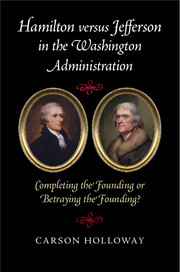 Hamilton versus Jefferson in the Washington Administration
Hamilton versus Jefferson in the Washington Administration Book contents
- Frontmatter
- Dedication
- Contents
- Acknowledgments
- 1 Introduction
- PART I A DEBATE BETWEEN CABINET COLLEAGUES
- PART II A CLASH OF RIVAL PARTY LEADERS
- PART III Founding Foreign Policy
- 11 Two Views of the French Revolution
- 12 Faith among Nations I: Jefferson's Opinion on the French Treaties
- 13 Faith among Nations II: Hamilton's Opinion on the French Treaties
- 14 The Constitutional and Political Theory of Hamilton's Pacificus Papers
- 15 Jefferson, Madison, and Helvidius' Critique of Pacificus
- 16 Conclusion
- Index
14 - The Constitutional and Political Theory of Hamilton's Pacificus Papers
from PART III - Founding Foreign Policy
Published online by Cambridge University Press: 05 November 2015
- Frontmatter
- Dedication
- Contents
- Acknowledgments
- 1 Introduction
- PART I A DEBATE BETWEEN CABINET COLLEAGUES
- PART II A CLASH OF RIVAL PARTY LEADERS
- PART III Founding Foreign Policy
- 11 Two Views of the French Revolution
- 12 Faith among Nations I: Jefferson's Opinion on the French Treaties
- 13 Faith among Nations II: Hamilton's Opinion on the French Treaties
- 14 The Constitutional and Political Theory of Hamilton's Pacificus Papers
- 15 Jefferson, Madison, and Helvidius' Critique of Pacificus
- 16 Conclusion
- Index
Summary
By 1792, Hamilton and Jefferson had developed a political enmity of the most serious kind. Each man now believed not only that the other was mistaken in his approach to domestic policy but in fact that the other represented a threat to the preservation of the American regime. Hamilton opened his first Pacificus essay by placing this charge, if not directly at Jefferson's feet, then at the feet of his partisans in the public papers, whom Hamilton regarded as the instruments of the secretary of state. Public criticism of the neutrality proclamation, said Hamilton, manifested a spirit “not very friendly to the Constitution” of the United States. Some “objections” to the proclamation had been “urged in a spirit of acrimony and invective,” which proved “that more was in view than merely a free discussion of an important public measure.” Rather, the fierceness of the criticism pointed to “a design of weakening the confidence of the people in the author of the measure.” And this effort to diminish public support for the president in turn aimed to “remove or lessen a powerful obstacle to the success of an opposition to the government” itself. This was the radical aim to which the Republican critics of the administration “adhered,” and which they “pursued with persevering industry,” even though they modified their approach to it as circumstances required.
Hamilton therefore sought to defend the government and the Constitution by replying to these criticisms of the proclamation. Hamilton arranged the principled objections “under” three “heads,” embracing constitutional, legal, and moral considerations. First, it was held that “the proclamation was without authority,” or that the president is constitutionally unauthorized to issue such a proclamation. Second, the proclamation was said to be “contrary to our treaties with France.” Third, it was held that the proclamation was “contrary to the gratitude which is due” from America to France, “for the succors rendered to us in our own revolution.”
The President's Constitutional Authority in Foreign Policy
Hamilton aimed in the first Pacificus essay to reply to the first objection and thus to vindicate the president's constitutional authority to issue a proclamation of neutrality. This vindication required as a preliminary step an examination of the “nature and design” of such a proclamation.
- Type
- Chapter
- Information
- Hamilton versus Jefferson in the Washington AdministrationCompleting the Founding or Betraying the Founding?, pp. 256 - 287Publisher: Cambridge University PressPrint publication year: 2015


